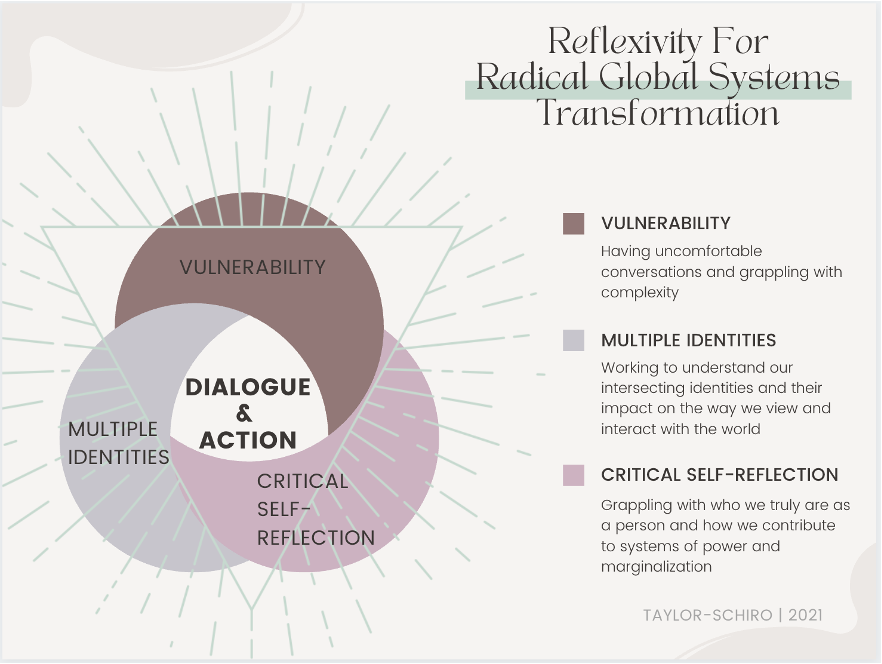
Aaniin indinawemaaganag (Hello friends/colleagues). I’m Elizabeth Taylor-Schiro/Biidaabinikwe (St. Croix Chippewa/Lac Courte Oreilles Ojibwe), Independent Evaluation and Research Consultant and PhD Candidate at the University of Minnesota.
As a young and emerging evaluator (YEE), when I consider transformational learning and change, my definitions of transformation, learning, and what it takes to make a change are different than how any other individual thinks of these concepts. This is because our stories are different; we each come to where we are through different journeys made up of different experiences, different knowledge, different filters and interpretations. My journey up to and through higher education and the field of evaluation have been reflections of and informed by these differences. The following Lessons Learned and Hot Tips are pieces of my journey.
Lessons Learned
- My intersecting identities as femme, as Indigenous, as a progressive – among many other identities – shaped, and continue to shape, the way I view and navigate these spaces. These identities and experiences have cultivated in me principles and practices that center critical thinking, self-reflection, and a willingness to be vulnerable with an understanding that there are multiple knowledges and multiple ways of knowing constantly at work. These concepts that I found critical to my own way of being I found lacking at a fundamental level within the field of evaluation and the way it is taught in my higher education experience, both formally and informally. Yet, I believe that it is these concepts that are needed in order for true radical transformation learning and change to occur and be sustained, and it is why I chose to center my evaluation research and practice on reflexivity for evaluation professionals.
- Reflexivity is a concept that has many definitions, but for me, reflexivity means doing the work to understand one’s many identities, how they were formed, and how they impact the way we show up in different spaces. It means recognizing that our identities are always influencing our thoughts, decisions, and actions, and then making the effort to understand what that means for ourselves and others. This takes an ability to practice vulnerability and critical thinking at a very personal level because it means that we have to wrestle with our own privileges, areas of improvement, and who we truly are as a person. This also means that we are sometimes going to come face to face with ways we have intentionally and unintentionally contributed to the strengthening of unequal power structures, systems of marginalization and harm, and colonized worldviews that perpetuate the erasure of people, of histories, of voices.
- We are going to be uncomfortable, but it’s something that we need to become accustomed to because this is the work that needs to happen if we are seeking global transformation. It is the hard questions that we need to ask of ourselves and one another; it’s the difficult conversations, the complex emotions, the learning of our biases that move us forward.
Hot Tips
- To continue moving forward toward global transformation that aims to strike out social injustices and their impacts on communities, we as evaluation professionals need to commit to normalizing the uncomfortable and making this inter- and intrapersonal work an integral part of our practice.
- Evaluation is in every sector. It is a part of the fabric across societies and it is not, we are not impermeable to white supremacy and colonization, or the unequal systems of power and harm that continue to perpetuate and be perpetuated by them. We must recognize our role in these systems, collectively taking action for sustainable change through critical reflexivity, vulnerability, and dialogue. A radical global systems transformation of learning and change requires a radical reckoning within ourselves.

The American Evaluation Association is hosting the Young and Emerging Evaluators (YEE) Week. The contributions all week come from YEE members. Do you have questions, concerns, kudos, or content to extend this AEA365 contribution? Please add them in the comments section for this post on the AEA365 webpage so that we may enrich our community of practice. Would you like to submit an AEA365 Tip? Please send a note of interest to AEA365@eval.org . AEA365 is sponsored by the American Evaluation Association and provides a Tip-a-Day by and for evaluators. The views and opinions expressed on the AEA365 blog are solely those of the original authors and other contributors. These views and opinions do not necessarily represent those of the American Evaluation Association, and/or any/all contributors to this site.
